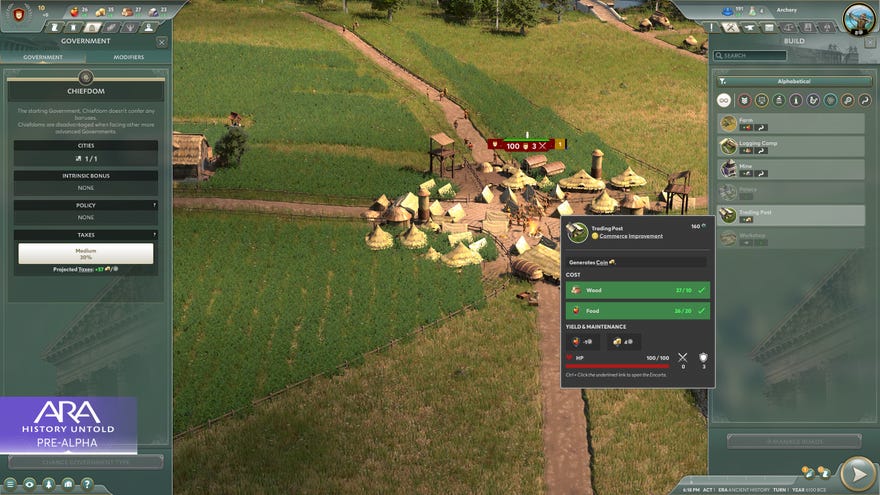Strategy games are no longer limited by the "stigma" of being "Smart Man's Games", says Ara developer
"There are just so many more routes into the genre now."
It's a good time to be a strategy game developer, according to Oxide Games, developers of Ara: History Untold, which happens to be a strategy game. Speaking to me during a showing of Ara - which is notable among turn-based 4X games for playing out every player's turn simultaneously - the creators offered a rousing characterisation of the genre, suggesting that strategy games have somewhat shucked off their association with stifling complexity and elitism, thanks not least to the recent influence of board gaming.
"When I started my career doing games, strategy games sort of felt very niche, and we weren't really investing in making new ones," commented chief graphics architect Dan Baker, whose credits include 2008's Civilization: Revolution and 2010's Civilization V. "There just weren't that many and the budgets were really small, so they were really scrappy." He thinks the genre's fortunes have "exploded" in recent years, however.
"It's unbelievable right now, not just in the triple A space, but in indie," added fellow Firaxis alumnus and Oxide Games design director Michelle Menard. "Just the amount of new players who are interested, the different kinds of new players who are interested - it's a wide open market space now. So things that might have been interesting to do, but years ago, you never would have never gotten internal support.
"It used to be like: that's too out there, that's too crazy, we have to stick to what we know will work, because our market caps at two million, so don't be too insane," she said. "Whereas now the potential markets are so much bigger, and there's so many more things you can do."
It's hard to put hard numbers to these claims, mostly because, as Menard suggests, "strategy" now covers a very wide range of projects, from the likes of Dune: Spice Wars to Cities: Skylines 2. I've read a few thinktank surveys of the genre's fortunes that I don't trust, partly because they blur together the mobile and PC gaming markets. But Baker and Menard's assessments do echo things we've been told by other strategy developers.
Speaking to Katharine the other day, Bit Reactor's CEO and former XCOM 2 art director Greg Foertsch argued that the genre has hitherto "suffered from lower budgets, which means it just hasn't pushed in the way that other genres have". He described strategy as "the genre with the most room to grow, innovate and change, and have rich stories and immersive art, and it just hasn't gotten its due". Foertsch has deliberately staffed Bit Reactor with a mixture of strategy game pros and experts on other genres, so as to ensure that the studio's untitled Star Wars collaboration with Respawn actually breaks some ground.
While Baker suggests that strategy games are more popular today than back in the Civ 5 days thanks to the massive success of Steam, Menard reckons the genre has also found a new following among people who got into board gaming during the Covid pandemic.
"I think some of it, too, is that they've started to lose that stigma and that almost gatekeeping nature of like, you know, the 'Smart Man's Games' sort of thing," she said. "Like, 'you do not belong here, this is a special place'. I don't really get that feeling anymore at all.
"And I think some of that might have to do with board gaming, actually - especially since the pandemic, you see a lot more people diving into these more complicated Euro games that actually give the player real choices to make. It's not Candy Land, where you're like, 'let me pick up a card, it's yellow, I moved to yellow, did I make a choice? No, I'm bored to tears.' I did not allow my child to buy that game when she was little - like, that does not stay in my house!
"But it's these games where you actually have agency, where you can make choices, where you can mess with people. Some of these boardgames are extremely family-friendly, with age ranges of eight and up. And people have been playing these now for years. And it's a very natural progression to say, 'I want to play this kind of thing online with my friends, I've got a PC, this looks like that game I play - and I can even get Everdell and other board games as a videogame port'. So I do think there's just more general acceptance that these are fun games."
Oxide's lead designer Michael Califf - a former Stardock and Mohawk Games developer - said of his own youth playing strategy games that there was "a pretty significant barrier to just getting into the genre". He told me that "there are just so many more routes into the genre now", and that strategy game devs have learned to make their complicated creations approachable - again, taking some inspiration from board games.
"In terms of board games, there's so much more prioritising of the element of 'we want everyone to be able to enjoy this game', rather than prioritising 'we want to make sure that the person who puts 2500 hours into this game still has things to learn and do'," Califf said.
"Both of those things are great," he went on. "But aiming at one of them is how you grow the space. And we've seen a lot more games aiming more in that direction lately. And I think that's had a significant impact on getting more people involved, and then eventually driving them to the games where there's a massive amount of meat that you can dive into, if that's something they end up interested in."
Question for the thread: if you were trying to get a friend into strategy games, which do you think they should start with? I think Civilization: Revolution isn't a bad shout, given that it was deliberately designed for time-strapped console players.




